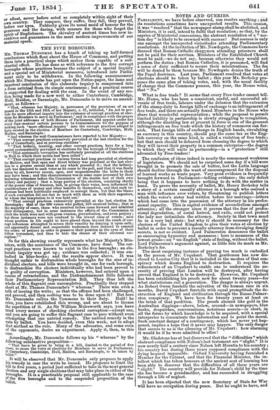SPIRIT OF THE NEW WAR THE war has scarcely commenced
and yet we have some earnest of the adventure which it promises, as we have of the achieve- ments that may be added to the list made by our fatheris; and at the same time we have a cheering promise that in spirit the war will not be unworthy of any that have gone before. It differs from the last great war in Europe principally in taking its origin amongst the less civilized parts of the Continent. The indenta- tions of the upper Baltic, the mountains and plains of the extreme East, the barbarous shores of the Euxine, present a degree of no- velty, a variety, and a remoteness, which lend to the newspaper chronicles of the day a chivalrous and picturesque character that belongs to older stories. Whether it is Sir Charles Napier sail- ing along a coast mysteriously quiescent in its endurance of can- nonading, or her Majesty's squadron under Sir Edmund Lyons making a marine tour of the Euxine, there is something very dif- ferent from the routine campaigning of more highly civilized coun- tries and well-peopled plains.
A letter published in the Times this week presents naval-mili- tary adventure in its most attractive form. The sailors who float pleasantly along the edge of the Black Sea find the monotony of ship-life relieved by landing in the romantic gorge of Gagri, where deep vallies and mountain-streams are shaded by primeval rocks shooting up to the skies, Alps on Alps rising from parklike lands, and topped with black pine and snow,—a "glorious com- bination of summer and winter." Here are seen Circassians loiter- ing about in armed ease ; at another point of the coast a monastery presents itself, embowered in trees, its circular green dome crown- ed by a golden cross, its spiritual garrison reduced to one monk. Here, lofty mountains shine with perpetual snow under a glaring sun ; there, thick woods send forth breezes laden with a perfume, of flowers ; and in the foreground Georgians alternate with Cir- cession. At Bochum Kaleh, the sailors land under a scorching sun, to visit a deserted hospital of "an enormous scale," and to gather vast bouquets of roses which cover the land in a profusion un- known elsewhere ; the wild peak of the Caucasus surmounting the scene. Within a few days this peaceful visiting is exchanged, at Redout Kaleh, for the bombardment of a town where the Russians had still lurked, and to which they set fire on leaving it,—a glorious night reddened with the fierce light of a conflagration. The vicissitudes, indeed, have not been all of a pleasing or pic- turesque kind : more than one death has placed English families in mourning ; and several of our countrymen are doomed to a te- dious captivity, with the precarious chance of being purchased by exchanges. But it is needless to say that reverses do not appear likely to daunt those who have set forth upon the enterprise. On the contrary, if success stimulates resolution, the loss of the Tiger screws up English determination to have revenge. The success of the Ueda not only shows the nautical tact and coolness which are latent in" landsmen," but is an example that other sailors will be eager to copy and to excel. The difference which we are willing to see is a more genial sympathy between our people and friends whom they find abroad ; -while the disposition to meet and chal- lenge the enemy, although less bitter than it has been at more barbarous times, is not less resolute and eager. To "get at" the Russians, is evidently the leading motive with all, both officers and men ; and yet the "natural enemies," France and England, are seen fraternizing at both extremities of Europe. Ambition and the love of gain still long for "prizes"; yet all, sailors and soldiers as well as civilians, fall in with the modern idea of treating com- merce with consideration, and of sparing needless mischief. To strike the power of Russia, to visit her with defeat, to enjoy vic- tory, are sports for which the appetite is as keen as ever ; but the peaceable and the friendly may perhaps learn- that the presence of the soldier is not inseparable from crime or destruction. If so, a more generous and chivalrous spirit will have returned to war- fare' and the utilitarian tendency of the times will appear in its best aspect.
A security for these improvements offers itself in a much-abused auxiliary of modern warfare. "Our own correspondent" mollies mistakes, no doubt. More familiar, perhaps, with Simpson's in the Strand, or the Wellington in Piccadily, than with barrack life, he takes the natural hardships of a campaign for the dreadful ladles of the commissary. Acquainted, possibly, with 'weapons only in the picked specimens of museums and guardsmen, he can- not, like the Prussian officer, estimate the true excellence of the weapons served out to whole regiments. He is misled for the time by appearances ; but one blunder corrects another, and to a certain extent a mirror is furnished for keeping the whole body of our force in campaign before our view. Soldiers, whether on shore
or afloat, never before noted so completely within sight of their own country. They conquer, they suffer, they fall, they prevail, before our eyes. Publicity gives its usual meed of honour for the generous and the daring, with censure for those who forget the spirit of Englishmen. The chivalry of ancient times has new in- centives and guarantees in the most modern improvements of our material epoch.



























 Previous page
Previous page